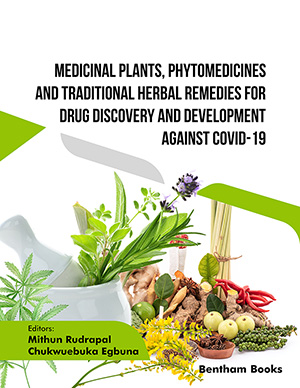Abstract
Background: Alzheimer’s Disease (AD) has become the most common age-dependent disease of dementia. The trademark pathologies of AD are the presence of amyloid aggregates in neurofibrils. Recently phytochemicals being considered as potential inhibitors against various neurodegenerative, antifungal, antibacterial and antiviral diseases in human beings.
Objective: This study targets the inhibition of BACE-1 by phytochemicals using in silico drug discovery analysis.
Methods: A total of 3150 phytochemicals were collected from almost 25 different plants through literature assessment. The ADMET studies, molecular docking and density functional theory (DFT) based analysis were performed to analyze the potential inhibitory properties of these phytochemicals.
Results: The ADMET and docking results exposed seven compounds that have high potential as an inhibitory agent against BACE-1 and show binding affinity >8.0 kcal/mol against BACE-1. They show binding affinity greater than those of various previously reported inhibitors of BACE-1. Furthermore, DFT based analysis has shown high reactivity for these seven phytochemicals in the binding pocket of BACE- 1, based on ELUMO, EHOMO and Kohn-Sham energy gap. All seven phytochemicals were testified (as compared to experimental ones) as novel inhibitors against BACE-1.
Conclusion: Out of seven phytochemicals, four were obtained from plant Glycyrrhiza glabra i.e. Shinflavanone, Glabrolide, Glabrol and PrenyllicoflavoneA, one from Huperzia serrate i.e. Macleanine, one from Uncaria rhynchophylla i.e. 3a-dihydro-cadambine and another one was from VolvalerelactoneB from plant Valeriana-officinalis. It is concluded that these phytochemicals are suitable candidates for drug/inhibitor against BACE-1, and can be administered to humans after experimental validation through in vitro and in vivo trials.
Keywords: ADMET, BACE-1, Molecular Docking, DFT, phytochemicals, in silico inhibition.
[http://dx.doi.org/10.1038/35014735] [PMID: 10850703]
[http://dx.doi.org/10.1038/414643a] [PMID: 11740561]
[http://dx.doi.org/10.1038/nn1797] [PMID: 17099708]
[http://dx.doi.org/10.1523/JNEUROSCI.2766-05.2005] [PMID: 16354928]
[http://dx.doi.org/10.1074/jbc.M505249200] [PMID: 15987683]
[http://dx.doi.org/10.1038/nn.4018]
[http://dx.doi.org/10.1016/S0006-291X(84)80190-4] [PMID: 6375662]
[http://dx.doi.org/10.1126/science.1899488] [PMID: 1899488]
[http://dx.doi.org/10.1038/sj.emboj.7600061] [PMID: 14749724]
[http://dx.doi.org/10.1016/S1534-5807(02)00189-2] [PMID: 12110170]
[http://dx.doi.org/10.1074/jbc.275.4.2568] [PMID: 10644715]
[http://dx.doi.org/10.1093/jn/129.3.756S] [PMID: 10082785]
[http://dx.doi.org/10.1007/s00214-009-0656-3]
[http://dx.doi.org/10.1016/S0014-5793(00)01192-3]
[http://dx.doi.org/10.1038/85064] [PMID: 11224536]
[http://dx.doi.org/10.1016/S0014-5793(00)01192-3] [PMID: 10683441]
[PMID: 18440982]
[PMID: 27322406] [http://dx.doi.org/10.1002/cpbi.3]
[http://dx.doi.org/10.1016/S0169-409X(00)00129-0] [PMID: 11259830]
[PMID: 19499576]
[http://dx.doi.org/10.1002/0471250953.bi0814s24]
[http://dx.doi.org/10.1016/0009-2614(92)85807-M]
[http://dx.doi.org/10.1002/wcms.81]
[http://dx.doi.org/10.1016/j.compbiolchem.2017.04.005] [PMID: 28552695]
[http://dx.doi.org/10.1016/j.biosystems.2015.10.005] [PMID: 26521124]
[http://dx.doi.org/10.1038/aps.2012.21] [PMID: 22684028]
[http://dx.doi.org/10.1097/WAD.0b013e3181d5e540] [PMID: 20473137]
[http://dx.doi.org/10.1001/archinternmed.2012.3203]
[http://dx.doi.org/10.1148/radiol.12120010] [PMID: 23232293]
[http://dx.doi.org/10.1017/S0317167100015547] [PMID: 23227576]
[http://dx.doi.org/10.1196/annals.1418.005] [PMID: 19076369]
[http://dx.doi.org/10.1097/WCO.0b013e32835a3432] [PMID: 23160422]
[http://dx.doi.org/10.1503/jpn.110190] [PMID: 22894822]
[http://dx.doi.org/10.1146/annurev.pharmtox.43.100901.140248] [PMID: 12415125]
[http://dx.doi.org/10.2174/156720508783954767] [PMID: 18393800]
[http://dx.doi.org/10.1016/j.bmcl.2007.11.043] [PMID: 18068983]
[http://dx.doi.org/10.1111/j.1471-4159.2011.07476.x] [PMID: 22122681]
[PMID: 12737006]
[http://dx.doi.org/10.1016/0031-9422(91)83425-K]
[http://dx.doi.org/10.3171/foc.2007.22.5.5] [PMID: 17613235]
[http://dx.doi.org/10.1111/j.1750-3639.2005.tb00103.x] [PMID: 15779240]
[http://dx.doi.org/10.1161/01.STR.0000143452.85382.d1]
[http://dx.doi.org/10.1021/bi026232n] [PMID: 12206667]
[http://dx.doi.org/10.1126/science.290.5489.150] [PMID: 11021803]
[http://dx.doi.org/10.1016/j.jalz.2012.05.1588]
[http://dx.doi.org/10.1016/j.jalz.2012.05.1900]
[http://dx.doi.org/10.1016/j.neurobiolaging.2014.01.033]
[http://dx.doi.org/10.1016/j.jalz.2014.05.605]
[http://dx.doi.org/10.1016/j.jalz.2012.05.237]
[http://dx.doi.org/10.1016/j.jmgm.2007.03.015] [PMID: 17493855]






























